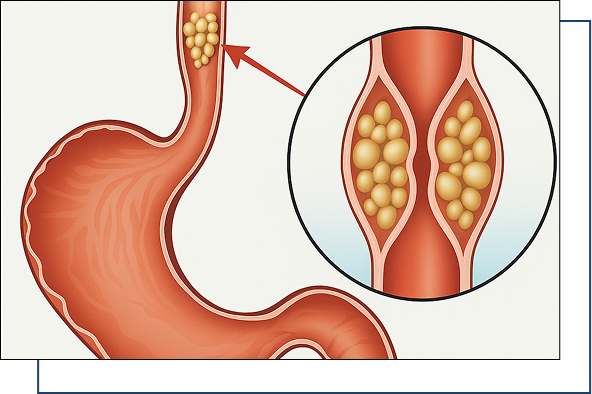Esophageal Cancer Treatment in Kolkata
Home > Esophagus Diseases > Esophageal Cancer
Overview
Esophageal cancer originates in the esophagus, the tube connecting the throat to the stomach. This condition affects swallowing and digestion. While it’s more common in men over 50, lifestyle and genetic factors also contribute to its development.

Esophageal Cancer Symptoms
Esophageal cancer symptoms often appear late, making early diagnosis challenging. Common symptoms include:
Fatigue and weakness

Chest pain or discomfort

Chronic cough
Loss of appetite
Nausea and vomiting
Unexplained weight loss
Heartburn or acid reflux
Indigestion
Book An Appointment
Causes and Risk Factors
Esophageal cancer causes are linked to lifestyle, medical, and environmental factors, such as:
Age above 55
Tobacco and alcohol use.
Chronic gastroesophageal acid reflux (GERD)
Barrett’s esophagus
Obesity
Dietary factors
Book An Appointment
Evaluation
Diagnosis involves a combination of:
Detailed physical exam
Endoscopy and biopsy
Imaging like CT scans, PET scans, CECT, EUS
Blood tests
Management
Dr. Debjoy Sau, a leading Esophageal cancer specialist in Kolkata, suggests personalized treatment plans depending on the stage and severity of the cancer. Treatment options may include:
Surgery to remove the affected tissue
Targeted radiation therapy
Advanced chemotherapy options
Combined treatment approaches with proper medicines
Stenting, feeding tube
Nutritional support
Pain management
FAQs
Know Your Answers
Is esophageal cancer common?
Esophageal cancer is a relatively uncommon cancer.
What are the stages of esophageal cancer?
Esophageal cancer is generally staged from 0 to 4, with stage 0 being the earliest and most treatable.
What are the rare symptoms of esophageal cancer?
Some rare signs of esophageal cancers are persistent hiccups and upper back pain.
How long does recovery take after surgery?
Most patients return home within 7-10 days. Full recovery typically takes 6-8 weeks with proper care.
How often should I get screened?
Annual screenings are recommended for high-risk individuals. Discuss your risk factors with your doctor.

